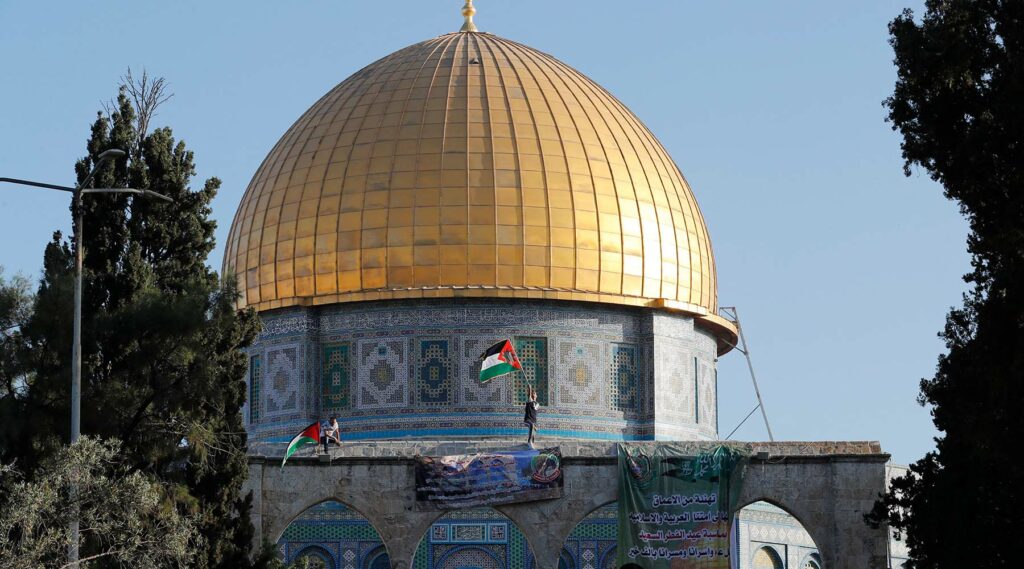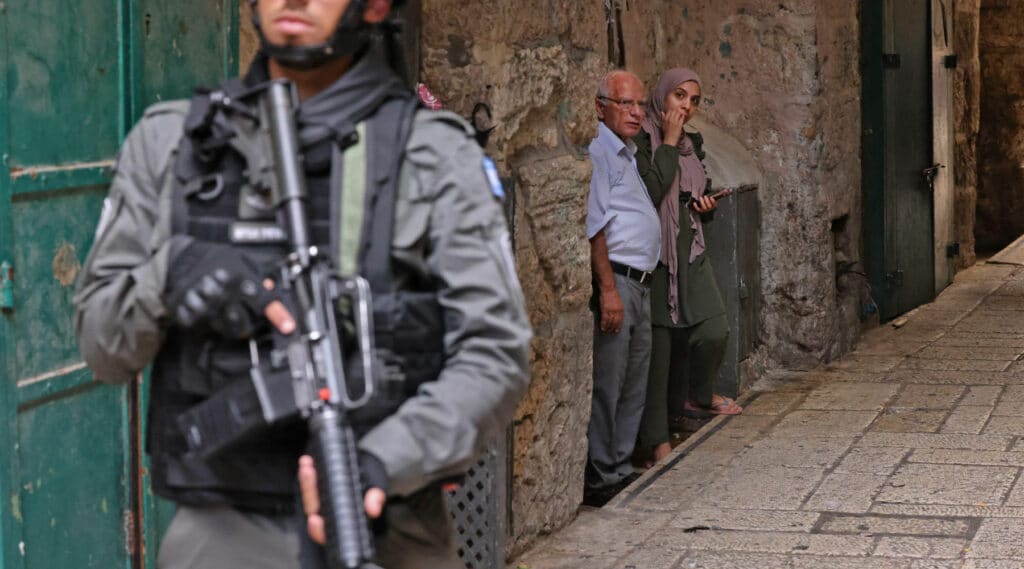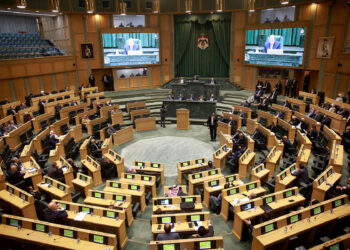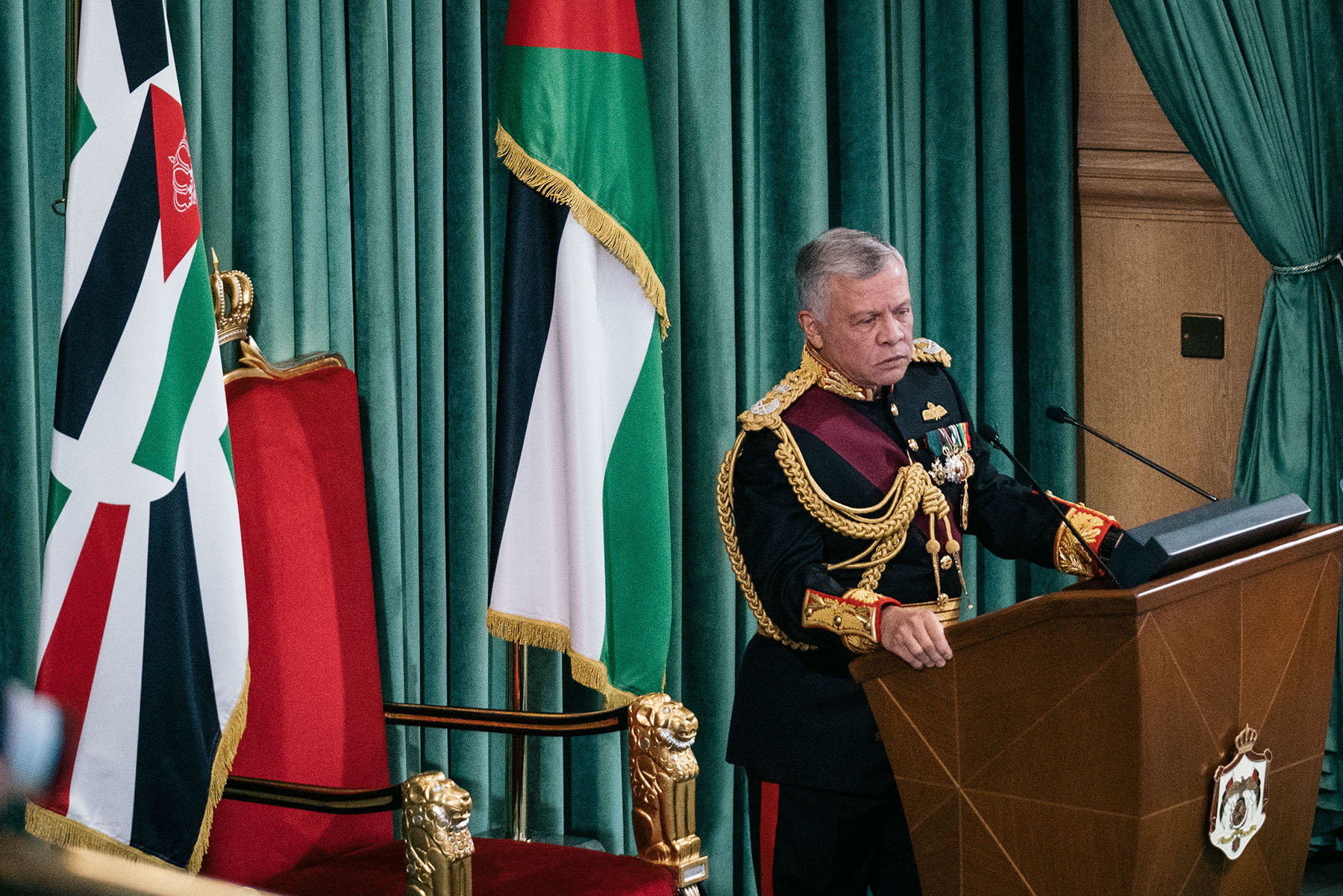Selma Dabbagh is a British Palestinian lawyer and writer of fiction who lives in London. She is the author of the novel Out of It and the editor of We Wrote In Symbols: Love and Lust by Arab Women Writers.
عربي
I have always viewed interior spaces—how they are decorated and related to by their inhabitants—as a clearer reflection of character than clothes. Certain vintage posters ("Visit Palestine"), lithographs by David Roberts, Dome of the Rock models made of mother of pearl, Iznik pottery and tatreez-embroidered cushions are ubiquitous in Palestinian homes. It is rare not to find at least one, if not all, of these items in a Palestinian interior, whether under occupation, in refugee camps, in exile or in the diaspora.
Palestinian writers and artists living in all of those circumstances have circulated a letter in recent days that has quickly gathered more than 15,000 signatures from other artists and supporters around the world. It demands the end of apartheid, "an immediate and unconditional cessation of Israeli violence against Palestinians," and "an end to the support provided by global powers to Israel and its military, especially the United States." These calls have been building for decades, but they were triggered this time by Israel's looming evictions of Palestinian families from their homes in the East Jerusalem neighbourhood of Sheikh Jarrah.
The status of Jerusalem as an internationalized city, a separate body—corpus separatum—is set out in U.N. resolutions that have been undermined for as long as they have existed. Since 1967, East Jerusalem and the West Bank, which it forms a part of, have been covered by the international law of belligerent occupation. According to the commentaries of the Geneva Conventions of 1949, there is one overriding criterion applicable in the laws of occupation: respect for the sovereign rights of the occupied people. To expel the civilian population and expropriate their property without military necessity is prohibited. International law is clear on how Palestinians under occupation should be treated, but Israel has evaded these provisions with increasing audacity. The push for more land (for Jews) and less (Palestinian) people on that land continues. Since 1967, the boundaries of Jerusalem have been enlarged, shaped and concretized to include as much territory under Israeli control, with as few Palestinian homes, as possible.

When studying law at Durham University in the early 1990s, I came across a book, Occupier's Law, by the Palestinian human rights lawyer and writer Raja Shehadeh. It described in great detail how the application of military orders and Israeli laws had suffocated Palestinian lives and livelihoods, and confiscated land, since the occupation began. In 1992, inspired by Shehadeh and supported by a law degree, I went to live and work in Palestine. The house I rented on the Nablus Road, in Sheikh Jarrah, was bare—three white rooms in an L-shape with vaulted domes. Its roof was at the same level as the road. Steps led down to the jasmine-covered gate into a courtyard, where my house sat like a temple. I slept on a mattress on the floor, owned a Bedouin rug and had no fridge. A telephone was out of the question.
I was twenty-two and unmarried. I had no boyfriend, no girlfriend, no family. I spoke little Arabic and was half-English. I worked for the Palestine Human Rights Information Center, or PHRIC, in Jerusalem, as a writer compiling reports on deaths and shootings of Palestinians by the Israeli forces. The First Intifada was in its last throes. Established in 1986, PHRIC was an independent organization that monitored and documented human rights abuses. It had provided data for Palestinian negotiators in the nascent talks with Israel following the Madrid Conference the year before—a peace process that was soon upstaged, and undercut, by the disaster later known as Oslo.
Encouraged to jog by a colleague, I passed a house one morning set back from the Nablus Road, uninhabited and in a state of neglect. It had a large balcony, wide porch and arched windows. Who could leave such a magnificent house? I asked my coworkers. Why?
"Oh, The Shepherd. That's The Shepherd," they said, using the name it was given when it was a hotel, during the period when the West Bank was under Jordanian control, between 1948 and 1967. Israel had expropriated the building under the Absentee Property Law, its main legal mechanism for transferring into the State of Israel's possession property that was owned by Palestinians who were expelled in 1948.
It was decades later that I heard of the Palestinian novelist Soraya Antonius, who was brought up in that house. At the time of her birth in 1932, it was called Karm al-Mufti ("The Mufti's Vineyard") and was owned by the Grand Mufti of Jerusalem, Haj Amin al-Husseini. He had leased it to her father, George Antonius, the author of the seminal work on Arab nationalism, The Arab Awakening, and an informal adviser to the Mufti, who was himself forced out of Palestine by the British in 1937.
In the evenings in Jerusalem, I attended Arabic classes at Notre Dame, a 19th-century Vatican-owned guesthouse, that lies on the unmarked boundary between the two sides of the city. I was joined by the wives of journalists, elderly monks and representatives from suburban American churches. The Western journalists, when I met them socially, were polite, but distrustful of anything I said—Palestinian sources, no matter how educated, evidenced or cross-checked, were viewed as being inherently dubious. I challenged, but, to my shame, also frequently accepted this premise. It was one I was all too familiar with by then.
Like millions of Palestinians, Soraya Antonius went on to live in exile. An outsider in Lebanon, Egypt, Cyprus and France, her predominantly Anglophile education mirrored my own. In 2000, Antonius, who had by then written two novels and several articles on Palestinian women prisoners, wrote of the state of "internal exile," brought about by her dissociation from her Arab roots through her formal education. Her article in the journal Alif, "The Day of Outside Education," spoke to me as an Anglo-Palestinian who had been taught Arabic in an insufferable, tedious way in English schools in Kuwait, where the teaching of Islam was even worse, the rote learning of random suras of the Quran required without context and under duress. Unlearning aspects of my earlier education, and the presumptions contained within it, became a quest for me, as it was for her.
The story of the grand Sheikh Jarrah house—"Oh, The Shepherd"—is familiar to anyone who followed events in Jerusalem during the Obama era. Its fate was ultimately determined by Irving Moskowitz, a Jewish American doctor turned gambling magnate who spent millions to further Israel's illegal settlement construction. A corporation Moskowitz owned allegedly bought the building in the 1980s, although who it was bought from and how is still unclear. After years of legal wrangling and protests, The Shepherd was finally torn down in 2011. Jewish-only apartment blocks now stand in its place.
Moskowitz, born in New York to Jewish immigrants from Poland four years before Antonius, said that he lost 120 members of his family in the Holocaust. He himself grew up in Milwaukee, a city with one of the largest German-American populations in the U.S., amid a climate of open anti-Semitism in the 1930s and 1940s. Moskowitz and his family suffered directly from the horrors that led to the strengthening of the postwar international legal order, which was designed to prevent them from ever recurring again.
Moskowitz has since died, although the far-right settler group he funded, Ateret Cohanim, continues to threaten and harass Palestinians in East Jerusalem, pressuring them to leave. But they continue to resist and to stay. The word in Arabic for this resistance is "sumud," or steadfastness. To exist is to resist.
While Soraya Antonius sought through her work with Palestinian refugees and prisoners, and in her own writing, to demand recognition for the rights of all people to their land and their dignity, Moskowitz's experience of trauma and prejudice drove him to subvert the international legal order that was supposed to guard against future abuses, particularly the protections for civilians living under military occupation. By pushing to transform Jerusalem into a city for Jews at Palestinians' expense, he created more patterns of violence and exclusion.

In 1997, I was part of a group of lawyers who went to Jerusalem for a "fact-finding mission," with a British voluntary organization, Lawyers for Palestinian Human Rights. I was soon to marry one of the other lawyers on the team, and we bought our rings on Salah al-Din Street, outside the Old City. What we found in Jerusalem, during interviews with business, hotel and land owners, health care workers and educational institutions, as well as with human rights organizations and lawyers, shocked our diasporic, English legal sensibilities. The way Israel's legal, regulatory and taxation systems crush Palestinian lives and livelihoods in Jerusalem is hard to summarize—deliberately so. It is labyrinthine, Kafkaesque, arbitrary, multifaceted, mystified and deeply discriminatory.
The bottom line is that if there is anything you want to do as a Palestinian Jerusalemite, the Israeli military and legal system is likely to block your way. It will tax you as much as Jewish residents, but give you a fraction of the benefits; prevent you from buying, expanding or improving properties; separate you from your family living outside the city boundaries, whether in the West Bank or Israel; make sure that no Palestinian institutions survive that serve your interests; and if you leave, however temporarily, it will often revoke your Jerusalem identify card, even though it is supposed to grant permanent residency in the city. If you protest this legal regime, it may well take your residency, too. The likelihood of imprisonment and arrest for resistance, or even for no reason at all, under the provisions of administrative detention are high. A shopkeeper in the Old City once described the process to me as "the snake under the sand, killing you with a thousand tiny bites." It was ethnic cleansing then, as it is today. It is a process underpinned by violence, but bolstered by law.
In 1992, I was prevented from returning to my life and work in Jerusalem, by Israeli border control at the Egyptian border at Taba and later at Rafah. It is difficult for people of Palestinian origin, like myself, to gain entry to work in or even visit Palestine, regardless of whatever passport they hold. I was young, broke and cause for suspicion. In 2013, I returned to write a radio play. I was again harassed by Israeli officials at the Allenby Bridge, held up for seven hours and told that if I ever took legal action against an Israeli soldier, they would "get me" no matter where in the world I lived. When I finally made it back to Sheikh Jarrah, the transformation was so brutal, I could barely look. It was as though a giant spoon had scooped out the tranquil valley, taking my little temple of a home with it. In its place was an entirely different population, who wandered around bright new buildings and shrines venerating contested archaeological remains. The wall—what Israel calls its "security fence," even though it's built out of huge slabs of concrete—severed and contorted the landscape. I didn't know where I was. Like many other Palestinian institutions in Jerusalem, PHRIC had long since been shut down, its data stolen by Israeli forces.
As a writer who writes in English, I have always considered it "useful, rather than a betrayal, to become proficient in the language of the two powers most directly responsible for the Palestine tragedy," as Soraya Antonius herself wrote. My writing also intends, as hers did, to "inform" the West, among other things. I do, however, increasingly reflect on Antonius's later re-evaluation. Looking back in 2000, she considered that this was "rather a colonisé reaction, implying as it did that Westerners were inherently godlike in impartiality and their injustice was born of misinformation."
Sheikh Jarrah has become the testing ground. Will international law and the rule of law provide some justice against an opaque and discriminatory legal regime designed to create confusion, strangle development, expropriate land and suffocate one group of people for the benefit of another? My naïveté is less than it was in 1992. But I still hold out hope. If pain and suffering are, as Simone Weil once famously put it, "a kind of currency passed from hand to hand until they reach someone who receives them but does not pass them on," then it is time for the transfer to stop.
Photo credit: Israeli bulldozers, working under police protection, demolish part of the former Shepherd Hotel in East Jerusalem's Sheikh Jarrah neighborhood, to make way for 20 new homes for Jewish settlers, Jan. 9, 2011. (Ahmad Gharabli/AFP via Getty Images)































![Security forces loyal to the interim Syrian government stand guard at a checkpoint previously held by supporters of deposed president Bashar al-Assad, in the town of Hmeimim, in the coastal province of Latakia, on March 11, 2025. Syria's new authorities announced on March 10, the end of an operation against loyalists of deposed president Bashar al-Assad, after a war monitor reported more than 1,000 civilians killed in the worst violence since his overthrow. The Syrian Observatory for Human Rights said the overwhelming majority of the 1,068 civilians killed since March 6, were members of the Alawite minority who were executed by the security forces or allied groups. (Photo by OMAR HAJ KADOUR / AFP) / “The erroneous mention[s] appearing in the metadata of this photo by OMAR HAJ KADOUR has been modified in AFP systems in the following manner: [Hmeimim] instead of [Ayn Shiqaq]. Please immediately remove the erroneous mention[s] from all your online services and delete it (them) from your servers. If you have been authorized by AFP to distribute it (them) to third parties, please ensure that the same actions are carried out by them. Failure to promptly comply with these instructions will entail liability on your part for any continued or post notification usage. Therefore we thank you very much for all your attention and prompt action. We are sorry for the inconvenience this notification may cause and remain at your disposal for any further information you may require.”](https://dawnmena.org/wp-content/uploads/2025/04/syria-22039885951-360x180.jpg)






